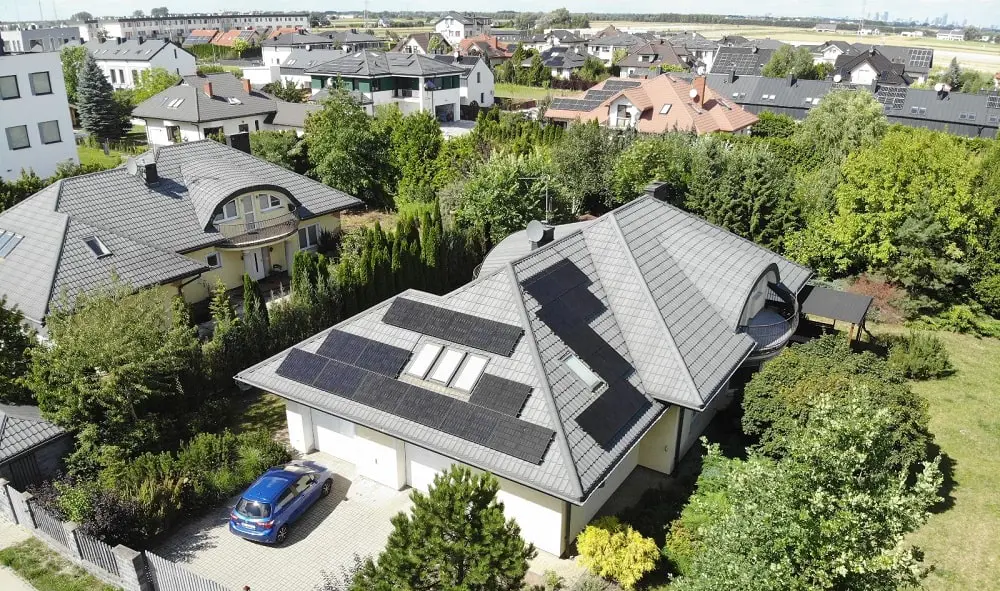
Faced with the global challenges of reducing greenhouse gas emissions and efficient energy generation, the European Union has set its sights on a revolution in construction. The recent energy efficiency arrangements under the EPBD (Energy Performance of Buildings Directive) draw a new future for the construction industry in Poland and across Europe. The planned gradual introduction of compulsory installation of photovoltaic installations on new buildings reflects the ambitious EU goals of reducing greenhouse gas emissions by at least 55% by 2030. As a member of the EU, Poland faces a choice of energy transition path and mandatory PV becomes a key element of this process.
The European Union guidelines, resulting from the adopted EPBD, represent a significant step in the energy transformation of the building sector. In pursuit of ambitious environmental goals, the European Union has set its sights on increasing the energy efficiency of buildings through the implementation of a number of measures, one of the key elements of which is mandatory photovoltaics.
Mandatory photovoltaics
For NEW businesses up to 250 m2 from 2026
For Existing companies up to 250 m2 from 2027
For private buildings from 2029
The EPBD introduces specific obligations for the installation of photovoltaic systems, and in particular photovoltaic panels, on newly constructed buildings. From 2026 onwards, companies and the public sector will be obliged to install photovoltaic systems on new buildings, as set out in the directive. However, there is a key condition – the installation must be justified “technically, economically and functionally”. This condition is intended to safeguard against haphazard or unjustified investments, while encouraging the development of solar PV where it makes sense and is cost-effective.
The introduction of this obligation on further building categories – non-residential in 2027 and new homes in 2029 – reflects the gradual nature of the changes and gives the market and investors time to adapt to the new standards. This approach also aims to minimise market disruption and enable a smooth transition towards sustainable energy.
In addition to making solar PV mandatory, the new EU guidelines also cover other aspects of energy efficiency. They prioritise the development of charging infrastructure for electric vehicles in new and retrofitted buildings, which in turn encourages the development of electromobility.

In the context of the European Union, these changes are part of a broader strategy under the European Green Deal. The target to reduce greenhouse gas emissions by at least 55% by 2030 requires a revolution in the construction sector, a significant source of emissions.
In this regard, Poland, as a member of the European Union, is obliged to adapt its building regulations and standards to the requirements of the EPBD. This presents the country with the challenge of implementing the new standards, while at the same time opening up broad prospects for the development of the renewable energy sector, especially photovoltaics, which can contribute to the sustainable development of the country and the economy.
The consequences of making it mandatory to install photovoltaic installations on new buildings, in line with European Union guidelines, create both challenges and potential benefits for Poland.
Mandatory photovoltaics – Challenges
Mandatory photovoltaics – Potential Benefits
Need help choosing a photovoltaic installation? We will advise you for FREE!
We offer:
We take care of all the formalities FOR YOU
Cooperation with the European Union in the context of the new guidelines for mandatory photovoltaics in Poland is becoming a key element for achieving the broader goals of greenhouse gas reduction and energy transition. This cooperation covers various aspects, both political, legal and economic.
As a member of the European Union, Poland is obliged to adapt its national law to EU directives. Cooperation with EU institutions and active participation in legislative processes helps to adapt national legislation to the mandatory PV guidelines. At the same time, it also provides an opportunity to co-shape the future of the energy sector in Poland, taking EU issues into account.
Good cooperation with the European Union is also important from the perspective of obtaining financial support for the development of photovoltaics. EU funds can be a key source of financing for projects involving the installation of solar installations on new buildings. However, effective use of these funds requires effective cooperation between Poland and EU institutions and transparent project planning and management.
Poland’s political involvement in the dialogue with the European Union may bring benefits in the form of better adaptation of new regulations to the specifics of the domestic market and energy needs. Active participation in negotiations and presenting one’s own perspectives helps shape the Union’s energy policy in a way that is adapted to the diversity of Member States’ situations.
The economic aspect is also important. Poland, by adapting to new standards, is becoming an increasingly attractive market for investments in the field of renewable energy. Foreign investment and technology transfers can accelerate the development of the domestic photovoltaic sector, which will have a positive impact on the economy and create new jobs.
The European Union, committing to ambitious greenhouse gas reduction targets, is introducing a revolution in the construction industry through the EPBD. A key element is mandatory photovoltaics on new buildings, to be phased in from 2026. As a member of the EU, Poland must adapt to the new standards, which creates both challenges and benefits. The need for financial outlay, adaptation of the construction industry and resolution of technical issues goes hand in hand with the development of the photovoltaic market, increased energy efficiency and the potential to create new jobs. Cooperation with the EU becomes crucial for Poland’s effective adaptation to the new guidelines, while opening up economic and investment prospects. The introduction of mandatory photovoltaics is not only a requirement, but also an opportunity to increase energy efficiency and develop modern technologies that Poland should use to achieve its energy transition goals.
Sources:
ul. marsz. Józefa Piłsudskiego 74/320
50-020 Wrocław, Polska
NIP: 8971903418
Jesteśmy na terenie całej Polski!
2026 © evolive.pl
Logowanie
Rejestracja